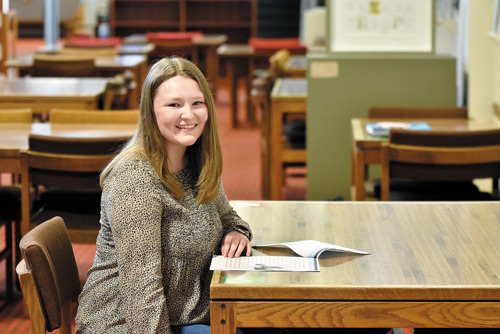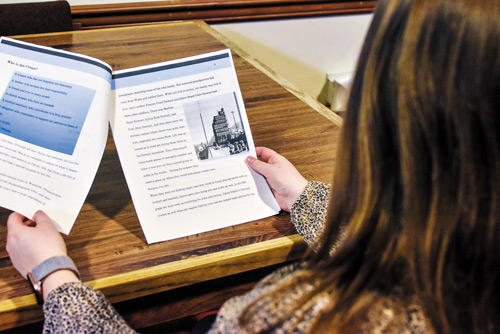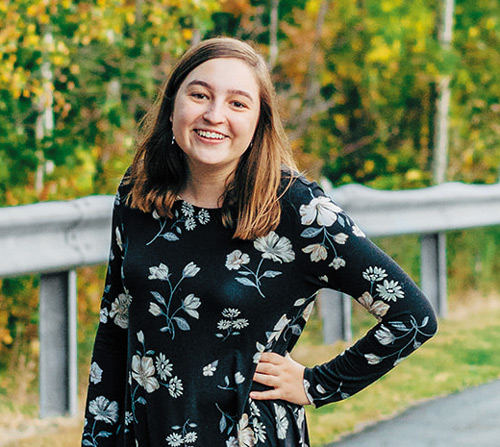Respect and call your elders

How do you develop a relationship and collect the oral history of an older generation during a quarantine?
During the fall semester in even-numbered years, students enrolled in the Psychology of Aging (GERO 231) course spend time with and interview an elder mentor for a cross-generational program. Of course, that’s how things worked before the pandemic. For fall 2020, COVID-19 protocols dictated that the students conduct the interviews and conversations with the older population via phone this year.
Typically, students pair with a grandparent or any older adult they choose for this program. This year, however, Distinguished Professor of Family Science and Gerontology Raeann Hamon collaborated with a resident services coordinator of low-income housing for older adults in Harrisburg for the program. The residents chose which students they wanted to work with, based on bios the students had submitted.
“One of the big advantages of doing it this way is you get a much more diverse group of elder mentors,” said Hamon.
Call up and just say hi

Before meeting their mentor, the class spent time rehearsing how to get comfortable just simply talking on the phone, a form of communication Gen Z doesn’t typically embrace.
“Students do not want to talk on the phone. There’s a lot of anxiety around the phones,” said Hamon. “But, for a lot of the older adults, they might have email, but they typically use a phone.”
In time, talking by phone proved to be a quick, flexible option for all.
“We didn’t have to plan out certain times we were going to meet. I just had to pick up the phone and call my mentor,” said human development and family science (HDFS) major Anna Weikel ’23, who took the class. “The last couple of weeks, we were able to meet screen-to-screen over a Zoom chat. This was a wonderful opportunity that made up for the distance during our time of getting to know one another.”
Listen and affirm
The class allows students to learn the value of intergenerational relationships and to integrate classroom learning with real-life situations and people.
“The direct interaction with older adults teaches students much more than I can teach them,” said Hamon.
In addition to their coursework, the students keep a journal of their experience.
The semester culminates with a 10-page memoir all about their elder mentor.
“All the conversation and writing put into a finished product that I believed would make my elder mentor proud meant so much to me,” said Weikel. “The little but meaningful life lessons that my mentor gave me were the most rewarding aspect.”
Paired with a 75-year-old female for this project, HDFS major Sara Jackson ’23 says she felt honored to listen to her elder mentor’s story.

“We talked about reminiscence therapy, and, for that to work, you have to have a good listener. Chronologically, we worked through her life. I never pressed her to share more than she was comfortable with,” said Jackson. “I had no clue who I’d find on the other end of the phone. We ended up having a lot of conversations about faith. It became a lot more than me writing a memoir about her life. She asked about my life, too.”
After the memoir project, some students keep in touch with their elder mentors.
“The last couple of calls with my mentor were the most meaningful. They finished telling their life story, and we got to talk to each other about other things. We found many similarities, cracked jokes and got to know each other on a more personal level,” said Weikel.
Hamon says the students felt privileged to facilitate this life review process for an older adult.
“It means something for someone to listen to your story,” she said. “A lot of these folks hinted at some very difficult things they had been through. It’s all about listening and affirming people.”
“It’s only temporary.”
“It is such a simple phrase, but hard to live by,” said Weikel. “I have found that I get caught up in the minor details, worrying about the trivial things of this life. My elder mentor repeated this phrase multiple times throughout every call that we had. She showed me that trials pass and that we must roll with the punches.”
While COVID-19 changed the structure of this class, and life as we know it, “it’s only temporary” serves as some good life advice for us all.
— Anna Seip